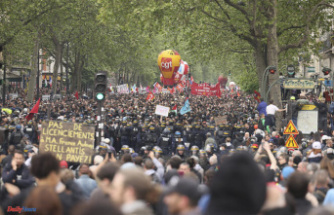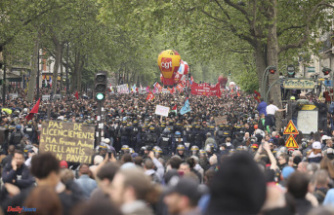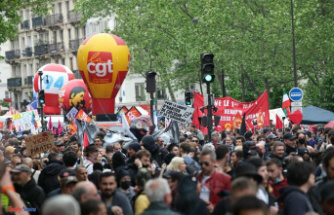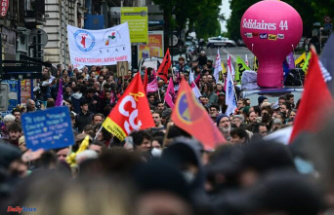Not only gas, but also electricity is becoming more and more expensive. On the stock exchange in Leipzig, the prices are really going crazy. ntv.de answers the most important questions about the electricity price explosion.
What's going on in the electricity market?
On the exchanges where electricity is traded, prices are rising rapidly to dizzying heights. The most important marketplace for Germany is the EEX in Leipzig. A year ago, one megawatt hour cost less than 50 euros for the following day. The price is currently 660 euros - that's 66 cents per kilowatt hour.
Why are prices rising so rapidly?
There are several reasons. Unusually high demand is currently coming from France, where around half of the nuclear power plants are currently not connected to the grid due to maintenance work or repairs. A lot of electricity is also exported to Switzerland, because not so much electricity can be produced from hydropower there due to the drought. Due to the low water levels, it has become more difficult in Germany to supply coal-fired power plants with fuel by ship. A major price driver is natural gas, which has become drastically more expensive due to the Russian supply cuts and is also used to generate electricity. "Some suppliers are under extreme pressure. The French lack electricity from their nuclear power plants. In order to meet their delivery obligations, they have to stock up - no matter what the cost," says Mirko Schlossarczyk, partner at the energy consulting firm Enervis, in an interview with ntv .de.
How is the price determined on the stock exchange?
Customers indicate how much electricity they will buy the next day in addition to the amounts specified in long-term contracts. Producers announce how much electricity they can produce the next day and at what price. It is bought by customers who need electricity at short notice. It is crucial that a unit price is determined, which applies to delivery on the next day. This unit price is determined by the most expensive type of production used to meet demand.
What shoud that?
The market system behind it is called "Merit Order". The principle: There is a sequence of operations for the producers offering on the electricity exchange. Those who can produce the cheapest electricity will be used first to meet demand. These are usually renewable energies. If the quantity offered is not sufficient, other power plants are added. In the end, the price determined at midday is based on the last provider switched on and therefore the most expensive. These are currently power plants that generate electricity with gas. And since the price of gas has risen so much, it's feeding through to wholesale electricity prices.
What is the purpose?
This system has worked well for a long time. On the one hand, it is an important incentive for the industry to focus on environmentally friendly power generation. On the other hand, it has ensured competition and thus low electricity prices. More importantly, electricity must constantly balance supply and demand to maintain the 50 hertz frequency. The "Merit Order" makes this possible.
Why is that so important?
Deviating even slightly from this frequency can damage electronic equipment. In the worst case, large fluctuations can lead to a blackout.
What is criticized about the "Merit Order"?
This system is what helps prices go up so much. In addition, operators of wind turbines, solar systems and coal-fired power plants benefit immensely - without having to do anything extra.
Are the high prices on the wholesale market resonating with consumers?
They don't fully impact the end customer. The electricity price they pay consists largely of surcharges and taxes. In addition, it is likely that more electricity will soon be generated from nuclear energy again in France and from hydroelectric power in the Alpine region. That would lower the price. But the effects can also be felt among private customers. According to the comparison portal Verivox, a kilowatt hour of electricity in an average household in Germany now costs 42 cents - 38 percent more than a year ago.
How is the federal government reacting?
Federal Economics Minister Robert Habeck wants to "lower prices for consumers and industry in the medium term through a fundamental reform of the electricity market. One idea is to decouple the development of end customer prices for electricity from the rising gas price. In the short term, the traffic light coalition should concentrate on relieving consumers. In the ranks of the SPD and the Greens, demands are growing louder for companies to skim off “excess profits.” The FDP rejects this.
What do economists say?
Most argue as with the gas price: it is normal in a market economy for a good to become more expensive when supply falls and demand rises. They warn against suspending this price mechanism because then there is less incentive to save. "Prime discipline of politics: state suppression of market prices as bearers of unwelcome messages," tweeted Stefan Koots from the Kiel Institute for the World Economy in response to the demand to at least temporarily suspend the market mechanism for electricity. The energy crisis is bad enough, the suspension of market mechanisms will make it much more expensive. Claudia Kemfert from the DIW takes a similar view: "Electricity price cap is not a solution, but the cause of the problem: Example France: electricity shortages due to nuclear power (...) meet electricity price subsidies," tweeted the economist. "Consequence: not enough savings and high permanent subsidy. Instead of an electricity price cap, better targeted relief."












